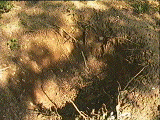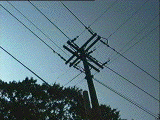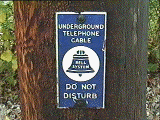 is for Bandwidth
is for Bandwidth is for Bandwidth
is for Bandwidth![]()
Several years ago, Leo Blume and I had this idea. We're lazy programmers, at least I am, and we wanted to make shopping automatic, like printing and building things. Like all the other buttons we press, we wanted groceries and pizza to show up on demand.
![]() I came up with this example: What to do if you're standing
there all dripping wet and naked like, mad because you ran out of soap in
the shower. Ideally, you could call the grocery store, and more shampoo
would automatically appear at your door. We added a bar code scanner to
the phone box to save the store people from having to hear, "I want
some more @#$% shampoo, NOW."
I came up with this example: What to do if you're standing
there all dripping wet and naked like, mad because you ran out of soap in
the shower. Ideally, you could call the grocery store, and more shampoo
would automatically appear at your door. We added a bar code scanner to
the phone box to save the store people from having to hear, "I want
some more @#$% shampoo, NOW."
 After running
some cost simulations we computed the overhead at worse than ten bucks a trip. This seemed more than people were willing
to pay just to finish their shower. It was certainly more than we were willing
to pay; Ten bucks was alot back then, so we scrapped the idea. We'd had these
"Deliverator" fugues
before and our worst nightmare was becoming, "The Grocery Delivery
People". Didn't seem like much of a future for tech-heads.
After running
some cost simulations we computed the overhead at worse than ten bucks a trip. This seemed more than people were willing
to pay just to finish their shower. It was certainly more than we were willing
to pay; Ten bucks was alot back then, so we scrapped the idea. We'd had these
"Deliverator" fugues
before and our worst nightmare was becoming, "The Grocery Delivery
People". Didn't seem like much of a future for tech-heads.
About a year later some East Coasters started using Newton palmtop computers for recording, storing and downloading grocery lists, and that was pretty cool. We were happy for them.
Yesterday, the on-line company "Pea-Pods" announced that it would soon be expanding into several new markets, including Seattle, Phoenix and the East Coast. They said they expect that it will take them about five years to be profitable. This was a good lesson for us, since we wanted to be profitable right away. Paying rent makes you think that way, especially when you're in debt from too much graduate school.
The reason I bring this up is that I have a new idea. I called Leo up and he thinks it's good too. It is probably the best idea I've had in five years. With the telecomm bill now passed, Now is a good time for it to be spread around.
The idea is this: The whole world of communication is coming down to a single word, and that word is Bandwidth, with a capital B. To use a plumbing analogy, Bandwidth is simply a way of stating how big your tube is. The bigger your tube is, the more you can do without going anywhere. Perhaps "tube" is an unfortunate choice of words. By "tube" I mean of course, that piece of plumbing that carries information to and from where you live, work and play. I don't mean the TV tube, though it is certainly one beneficiary of all this. I mean the wire, the cable, the plug 'N play thingie.
The trouble with giving everyone a bigger tube is that:



you have to dig up the yard AND stretch ugly wires for miles AND generally trash the place.
Now that would be bad, but worse yet, all that digging takes TIME, and "TIME is our only unrenewable resource".
How much Bandwidth do we need?
Well let's assume we want our information now, as in, Real Time. Further let's use the figure of 60 channels, since a cable TV has about that many unless you live next to Disneyland, or David Geffen. Let's take IMAX film frames running 45 frames a second (like Trumball's Spectra-Vision does) as the baseline. This works out to:
60 x 45 x (8192 x 4096 x 32) x 8 bits per second = 23 terabits per second
or nearly a billion modems running at 28.8 kbps. That is a cube of modems a thousand on a side. Remember, we haven't done any work yet, this is just so we can sit on our ass and flick through 60 large screen digital cable channels with the volume off on a really decent HDTV.
Giving each household 23 terabits per second translates to a Bandwidth of roughly 46 teraHz. Light, as opposed to wires, or tin cans with string, is clearly the way to go here. If we use fiber we end up digging ditches from here to New York City, which is, "Poor Form" to quote Ferris Bueller. If we use ultraviolet light like your CD player does, we can transceive information at 400 nanometers. If my physics lobe is still working:
![]()
so the frequency of 1 fiber channel is about 750 teraHz. Giving everybody their own fiber is a good start. One Human, One Fiber, but why make all that mess? Why dig up the yard?
 Why not use low power laser BEAMS running in free
air? Stick the lasers on top of phone poles. Bounce beams into the neighborhood
server/repeater. Tune them to slip into water's spectral window so they
can penetrate the rain. Lockheed already proved you can shoot a communications
laser a couple of miles before you need a repeater, so one doesn't need
too many hops, even in a big city. It saves wire, cable, shovels and the
whole thing.
Why not use low power laser BEAMS running in free
air? Stick the lasers on top of phone poles. Bounce beams into the neighborhood
server/repeater. Tune them to slip into water's spectral window so they
can penetrate the rain. Lockheed already proved you can shoot a communications
laser a couple of miles before you need a repeater, so one doesn't need
too many hops, even in a big city. It saves wire, cable, shovels and the
whole thing.
One Human, One Laser. Builds the semiconductor industry and doesn't hurt anyone. Maybe that's the solution...
© 1996 L. Van Warren · All Rights Reserved